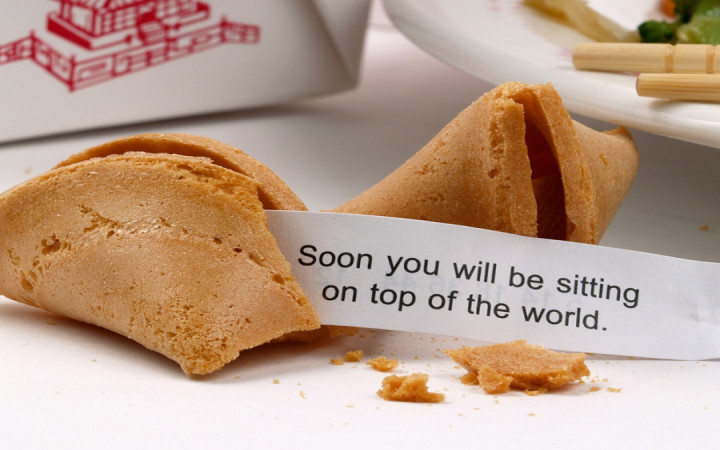You set down your chopsticks and push back from the table, leaving a clean plate that used to be filled with sesame chicken, lo mein, and potstickers. Your belly may be full of Chinese food, but there's just a little room left for dessert. Time to break open a fortune cookie!
Fortune cookies are uniquely-shaped, crisp cookies made from a simple recipe of flour, sugar, oil and either vanilla or almond flavoring. They are called fortune cookies, because each cookie breaks open to reveal a small slip of paper — a “fortune" — with a prediction for the future, a wise saying, a Chinese word or phrase with its translation, or even a list of lucky numbers.
Even though fortune cookies can be found in nearly every Chinese restaurant in America, you won't find them very often in China! In fact, fortune cookies were not invented by the Chinese.
Exactly who invented the fortune cookie and when is the subject of some debate. Some people claim Makoto Hagiwara, a Japanese immigrant from San Francisco, first served fortune cookies in the late 1890s or early 1900s. This was a way of saying “thank you" to visitors to the famous Japanese Tea Garden in Golden Gate Park, which he designed.
Others claim the fortune cookie was invented in 1918 by David Jung, a Chinese immigrant living in Los Angeles who founded the Hong Kong Noodle Company. Jung was worried about the homeless people living on the streets near his shop. He created fortune cookies and passed them out for free. Each cookie contained a small slip of paper with an inspirational Bible verse.
Some Japanese people believe fortune cookies got their start as early as the 19th century in Kyoto, Japan. Cracker-like cookies — called tsujiura senbei — were popular in Kyoto. They were larger and darker than modern fortune cookies, but they did contain a fortune tucked into the bend of the cookie.
Regardless of their exact origin, fortune cookies became very popular in the United States after World War II. Perhaps because desserts were not traditionally part of Chinese cuisine, Americans enjoyed ending a Chinese meal with fortune cookies that seemed familiar, yet exotic.
At first, fortune cookies were made by hand using chopsticks. Today, they are mass-produced by special machines. The world's largest fortune cookie maker — Wonton Food Inc. — is located in Long Island City, New York. It ships over 60 million fortune cookies every month!
Around the world, more than three billion fortune cookies are made every year. Isn't that incredible? Just do the math. If there are that many fortune cookies, how many meals are served in Chinese restaurants each year? It must be billions!
As for predicting the future, no, fortune cookies don't have special powers of foresight. The fortune cookie you open at a Chinese restaurant came into your hands randomly. If it happens to contain a fortune that comes true, it's just coincidence.
Besides, many fortunes don't even predict the future. Instead, they may offer simple advice that may or may not be helpful. If you're looking for insight into your future, you probably don't want to place too much importance on a tiny slip of paper from a mass-produced cookie!
You might, however, want to use the “lucky numbers" sometimes listed in fortune cookies if you play the lottery. In March 2005, over 100 people claimed second-place prizes in the Powerball lottery, because they had all used the same set of lucky numbers contained in a batch of fortune cookies!




